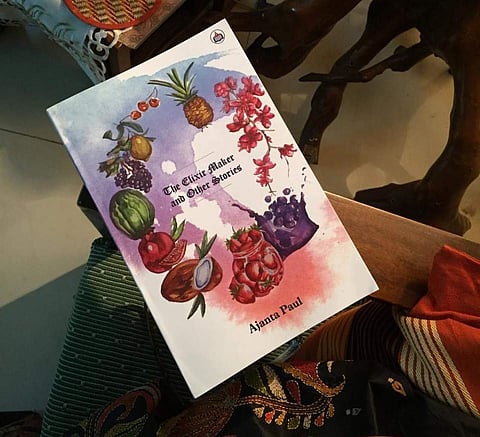
- LIFESTYLE
- FASHION
- FOOD
- ENTERTAINMENT
- EVENTS
- CULTURE
- VIDEOS
- WEB STORIES
- GALLERIES
- GADGETS
- CAR & BIKE
- SOCIETY
- TRAVEL
- NORTH EAST
- INDULGE CONNECT

Ajanta Paul is a published author with her poems being quite famous in literary circles. The writer, who's also Principal of the Women's Christian College, has now ventured into writing fiction, with a collection of short stories titled, Elixir Maker and Other Stories. Excerpts from an exchange:
The Elixir Maker and Other Stories is your debut work of fiction. What made you change your genre from poetry?
Yes, it’s true that I began my literary journey with poetry, but as I was always very passionate about spinning stories in my head, I decided to take the plunge and the result is The Elixir Maker and Other Stories.
Why did you choose short stories, rather than a compilation of your poems, or a proper novel?
I have always been drawn to short stories, because of the form's uncanny ability to present the truth of a situation and characters most evocatively and economically. Personally, I’m a great believer in timing. I feel it had to happen now, and so it did. The stories just kept piling up within me, and so I had to exorcise them! As for poetry, a collection is shaping up. After long meanderings, I shall be returning to my first love. About the novel – now, that’s another story. A novel is longer, more complex, structurally more demanding - and I would need to invest the kind of time that I don’t have now. For the moment, I’m happy with a shorter form of expression, as this allows me to balance my professional responsibilities with my love for writing.
Tell us more about the book, and the stories in it.
The book is a collection of 12 short stories of varying length, on a variety of themes encompassing natural calamities, social ills, historical upheavals, legal disputes, professional interactions and domestic situations. While some of them deal with human relationships in a modern, urban setting with a predominant focus on loneliness and loss, a few are set against a rural background. Most of them, I believe, reflect current social predicaments in their numerous nuances and moods, working their way around the edges and overlaps of events, emotions and experiences as they unfurl in the course of action.
An exception is the short story, The Elixir Maker, which employs a magic realist mode, and is deeply allegorical in orientation. I have used the technique of oblique narration in stories such as Storm and Freedom – oral storytelling in the former, and ethnographic notes in the latter - and I have used free, indirect discourse in stories such as The Lawsuit and Glass.
I have also tried to use innovative narrative and structural tools such as the leitmotif of the crossword puzzle in Misunderstanding. Humour and pathos co-exist in stories such as Fat Mamma, Wayfarers and Chair, as reminders of the universal human condition. At times, an autobiographical element informs the stories, The Lawsuit being an example. That said, all the stories are, without exception, highly symbolic, ironic and ambiguous, with several of them depending on a surprise ending for a special effect. The characters, as far as possible, have been realistically drawn - sourced both from the imagination and actual life, and have been bestowed with a variety of traits and treatments - to inspire and retain the interest of the reader.
Do you have a favourite story in the book?
You could say the story Storm is my favourite, but that is an author’s preference. If the author in me recedes, and the critic comes to the fore, it would have to be Glass or Freedom, which practically wrote themselves. Consequently, I feel like they come together more effectively as stories.
How is this different from writing non-fiction?
Fiction and non-fiction are responses to two very different intellectual motivations and, as such, reflect this in their methodology. While non-fiction calls for a detached, objective and critical approach, which takes apart an idea, ideology or text, fiction is an imaginative and creative expression that synthesises rather than dissects. While non-fiction typically requires research, analysis and the development of arguments, eventually culminating in findings - fiction is all about finding oneself, or that elusive truth that may be refracted through a word, phrase, image or situation. For me, both forms - notwithstanding their essential differences - are very exact crafts, demanding the utmost engagement.
Could you give us an idea of your target audience?
My stories are not intended for any specific readership, and are expected to appeal to anyone out for a good read.
And, would you have any future plans to share, please?
As I mentioned earlier, a collection of poems is shaping up. A second collection of short stories too, is on the anvil. A novel perhaps, in the foreseeable future!